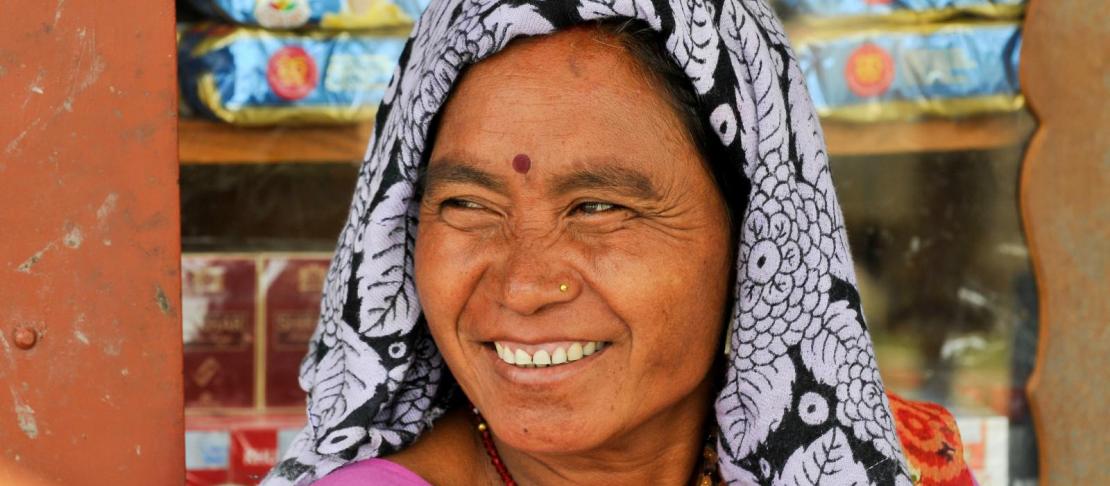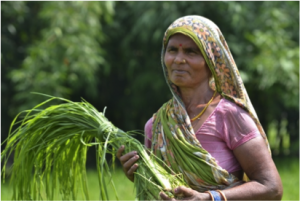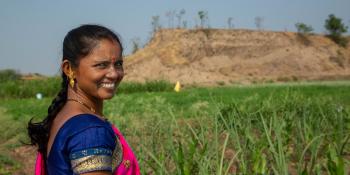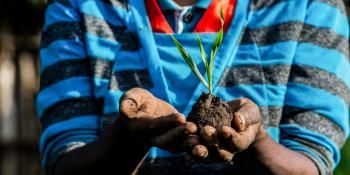Help through participatory videos - documenting farmers' experiences in real time

by T.N. Anuradha and Vinaynath Reddy
Various interventions are being implemented in villages of Vaishali district of Bihar in India by the CGIAR Research Program on Climate Change, Agriculture and Food Security (CCAFS). Three villages, namely Rajapakar, Bhattadasi and Mukundpur in Vaishali district, come under the banner of Climate Smart Villages (CSVs). These CSVs have a participatory action research program with rural communities and other stakeholders. In order to develop an uptake strategy for up-scaling the program and impact assessment, a series of video documentation has been developed with the help of Bigg Shift Communication. This way of communication, also named as ViDocs, was chosen as it would help in gauging the impacts of CCAFS activities through the eyes of farmers.
Our first encounter with farmers involved in the Climate Smart Villages project was at the 'pustakalya', meaning ‘library’, in Rajapakar village. The community library had no books but served the purpose of a hall, which resembled a classroom, enabling gatherings for the community members. We met Vidaynath Singh, who has been implementing the package of practices as per recommendations from the implementing partners. He started discussing issues related to traditional farming and the new technique being implemented under System of Rice Intensification (SRI). The issues discussed among the farmers were something that is hard to document. That’s what ViDocs is set to achieve: document the experiences of farmers in real time.

"Cultivating rice at a time when rainfall has been low," he said, "would lead us to lose our investment made so far. However, if predictions are right and it rains through September, our worries will be wiped out." He said that the money invested in tube-well irrigation, mainly through diesel-operated engine, is very high. "For approximately 2528 m2 (one Bigha), minimum time required is 10 hours. Because of delayed rain, this season, we irrigated twice. Earlier, the yields were low; hence we hesitated to use irrigation. Now, we have seeds of improved varieties, and we are following advanced agronomic practices. As per SRI practice, we give timely irrigation and required fertilizer in our field. I believe this time, we will reap rich harvest," beamed Vidayanath.
The limiting factor in Vaishali district during this season was delayed monsoon. The delay in rainfall led to delay in raising the nursery for paddy crop. However, most farmers of CSVs with access to irrigation, raised nursery on time and followed the package of management practices, contained in the SRI, by planting the young seedlings. Additional compost or other organic materials were applied to the field. The rice crop was irrigated to the field capacity, thus saving irrigation water. As monsoon set in during late July to early August, the rice crop stand has been good resulting in a successful intervention.
Similarly, an active participation in the Voice Short Message Service (SMS) being implemented by IFFCO Kisan Sanchar Ltd. and Indian Meteorological Department (IMD) has been observed. Farmers often lack timely, relevant, and accurate information. Poor infrastructure and lack of electricity supply in villages leave farmers almost isolated to local information. However, high penetration of mobile phones in villages and new initiative of Voice SMS has changed that.
Under this outreach initiative, farmers of Rajapakar, Bhattadasi and Mukundpur were provided with SIM cards at the cost of 0.5$ approximately. The SIM card also come with the free talk time of the same amount, making the services cost-neutral to farmers.
The message received by farmers contained expert advice, which focused on crop management, weather forecasts, livestock management, village development, crop insurance, loans, and other relevant information. On an average, farmers receive 3-4 voice SMS every day.
The program also offered farmers an opportunity to ask questions and address concerns about any issues that they feel is incomplete. With this service, farmers started receiving expert advice on mobile phone. Horil Singh, a farmer from Rajapakar village says: "I almost quit farming in 2008. In the past two years, with proper support and information that we received, we have started afresh. Information that we receive on various topics is very useful. We are applying that information and knowledge to our farm." Today if a farmer needs any information, then they don’t have to go out in search of agriculture experts. Most of the information is available on mobile phone right in their village.
"We didn’t have much information about pesticide application, but now we get timely information, and we apply it to crops as per advice received on mobile. Likewise, we get information on livestock, weather forecasts and other useful subjects. Weather forecast helped us to know if rainfall is predicted in coming days hence we are in a position to plan better," says Devender Singh from Rajapakar.
Mrityunjaya Kumar from IFFCO Foundation adds: "In this project we started with agri-advisory services wherein farmers were given Green SIM card. Through these farmers received 3-4 messages every day. Earlier, these were text-based messaging services. As you know, due to low literacy levels, the uptake of information was limited. With Voice SMS, they can listen and make use of the information. Farmers are eager to know more."
The initiatives from CSVs of Vaishali district have proved to be successful interventions and can act as a solution for the farmers trying to adapt to climate change scenarios.
T N Anuradha is a development professional of Environment Management, Food and Nutrition Security, Information Communication Technologies and Knowledge Management. N. Vinaynath Reddy is a freelance film-maker.


